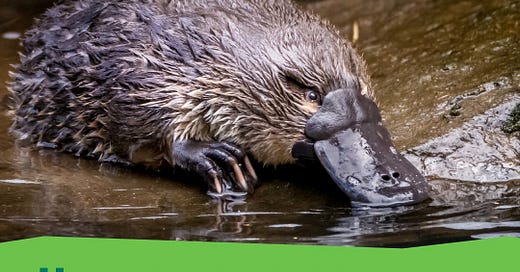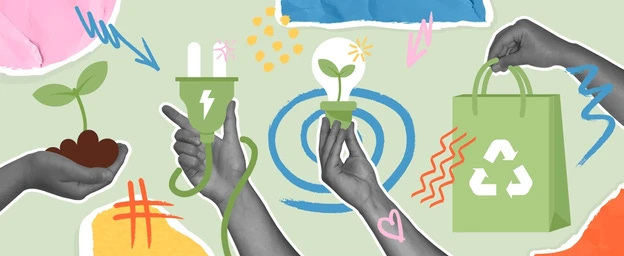Platypus, bush care, climate action and doughnuts
August Community Conversation: Sustainability means different things to each of us
The August Community Conversation was a meandering discussion which covered a range of ideas. The discussion reinforced the breadth and depth of topics that fall under the sustainability and conservation banner. This poses challenges to selecting topics for community discussion as there are so many interesting areas to cover.
Sustainability looks different for each person
The discussion highlighted the variety of views and the wide range of experience, talents, and interests at the conversation. It became clear that sustainability looks different for each person, because there’s no one-size-fits-all approach. We all come from different backgrounds and face unique circumstances. Some people prioritise climate action and renewable energy, others champion sustainable transport, some advocate for verge gardens and street trees, while others focus on circularity and low waste living. There are countless ways to adopt sustainable practices and engage in broader activism, and all are valid.
This diversity is actually a good thing and is part of the strength of the sustainability movement. It means there are heaps of options and ways to make a difference. Something to suit everyone, really. We discussed how just because someone isn’t doing the same thing as you doesn’t mean they aren’t doing anything or are doing it wrong. The variety of approaches collectively drives progress, so it’s important not to judge others but to understand their focus and motivation. For example, one person at the conversation said they would never consider buying an EV. This was an “eyebrow raising statement” for some attendees until the person explained they mostly walk or cycle for transport and don’t drive enough to justify getting rid of an existing vehicle (with all the embodied carbon and resources).
Sustainability conversations must meet people where they are
Conversations are so important and have the real power to create change. We also spoke about how talking about sustainability can be awkward or even really hard and that lots of people in our lives and community don’t want to enter into those conversations. Many attendees felt that people prefer to stick to the safer environmental and sustainability topics as they don’t want to have confrontational conversations. Some people don’t want to talk about sustainability because it raises uncomfortable feelings about how big the challenges seem or maybe they feel like they are being criticised or it can start arguments.
We also spoke about how many people in our community are focused the daily challenges of a busy life and the increasing cost of living and don’t feel they have the bandwidth or resources for being involved in sustainability activities. Not everyone carries the same advantages we do, and some sustainable options can often cost more or be more time consuming. There are so many factors that come into play when it comes to people having time, resources and energy, so it’s important our sustainability conversations are sensitive to these things and can meet people where they’re at without judgment.
Focusing on solutions
Because sustainability is such a big topic and the challenges can seem overwhelming, most people in attendance are interested in local actions on a specific issue to make a difference. To that end we decided on three areas of focus for the next three months.
September - Platypus
Linking with the ACF Platy Project we will work towards a platypus focused community event and/or community conversation in September. Stay tuned for more details.
Interestingly there are platypus living in creeks and rivers in north Brisbane suburbs including Bridgeman Downs, Albany Creek, Toombul and Brendale (Check the map of sightings).
Some attendees have a strong interest in Bushcare and we will explore options to start a Bushcare group in the area around Wendon Way Park in Bridgeman Downs to plant out the banks of Albany Creek to stabilise them and improve platypus habitat.
October – Guest speaker/s from Moreton CAN (Climate Action Now)
At our August Community Conversation, we were joined by three members of Moreton CAN (Climate Action Now). They shared some of the great work they have been doing and how they addressed some of the barriers and challenges. We hope they can come along to the October Community Conversation to tell us more.
November – Doughnut Day
Our November Community Conversation will explore Doughnut Economics to celebrate the Global Doughnut Days, a multi-day, community-led festival conceived by the Doughnut Economics Action Lab (DEAL). Doughnut Economics highlights the economic thinking needed for humanity to thrive in the 21st century between social and ecological limits. It’s based on Kate Raworth’s 2017 book, Doughnut Economics: seven ways to think like a 21st century economist, which explores how to bring humanity into the Doughnut, by drawing together insights from diverse economic perspectives in a way that everyone can understand.









Thank you to the members from Moreton CAN who told me about Zero Emissions Noosa project to establish community batteries. As I have recently joined The Gap Sustainability group the web sites have been a trove of information to bring me up to date on the benefits of community batteries and what communities are doing to make this a reality.
https://www.zeroemissionsnoosa.com.au
https://thegapsustainability.org